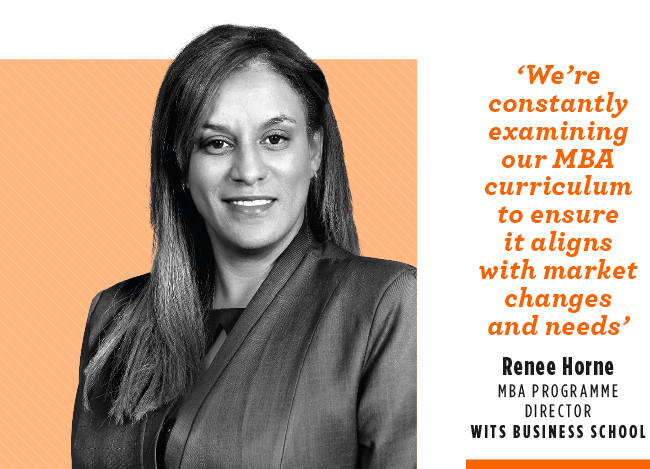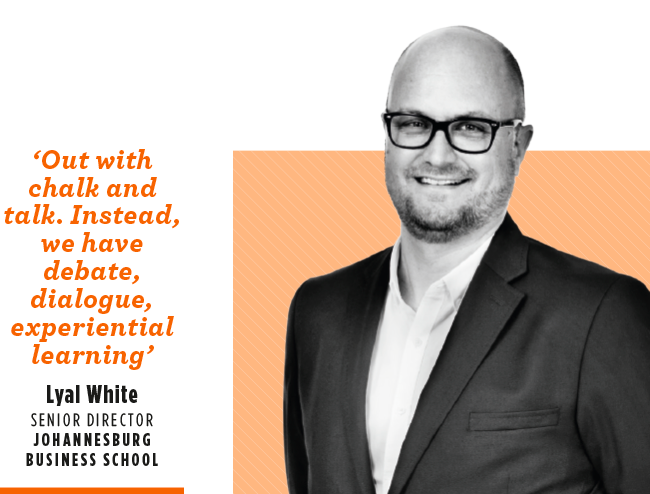The fact that comedians and musicians can study for a specialised Master in Business Administration (MBA) in SA shows that the MBA has changed. By the way, how many MBAs does it take to change a light bulb? Answer: only one. He holds the bulb and expects the universe to revolve around him.
But (bad) jokes aside, the MBA has evolved dramatically from a time when it was such a rare and prestigious qualification that employers would gladly have stopped the universe in its tracks to attract graduates, to today where an MBA is no longer the golden ticket to the C-suite.
There’s even a new breed of MBA that doesn’t intend to accelerate careers in big business. ‘We’re consciously not targeting corporates and instead teach practical business knowledge that equips entrepreneurs to grow their SMEs in order to create jobs and expand our economy,’ says Lyal White, senior director of the University of Johannesburg Business School (JBS). The country’s newest MBA kicked off in 2020 with more than 80 registered students – significantly more than anticipated.
‘Out with chalk and talk. Instead, we have debate, dialogue, experiential learning, and we promote the use of toolkits to get things done,’ says White. ‘At all times teaching is relevant, practical and geared to the technologically rich environment of business.’ JBS classroom debates also cover ethical, environmental and social concerns of businesspeople in SA, including issues such as shareholder versus stakeholder purpose and the impact of business on society.
At leading business schools worldwide, the MBA is no longer all about profits and earning potential but more about creating responsible, self-aware, agile and courageous leaders – which shows how the purpose of the qualification has been evolving, along with its format, delivery methods and student demographics. Take, for example, the first MBA cohort at UCT’s Graduate School of Business (GSB), just more than 50 years ago. ‘The class was exclusively white and almost entirely male, and all came from industry. Today, our classes reflect a much wider demographic and experience base that needs to be valued and accommodated,’ says Kosheek Sewchurran, director of the GSB Executive MBA.
Over the past years, the MBA has been declared ‘dead’ by critics, and discussions about its relevance and return on investment are ongoing. Despite this criticism, it remains the most recognised business qualification.
‘We’re constantly examining our MBA curriculum to ensure it aligns with market changes and needs,’ says Renee Horne, MBA programme director at Wits Business School (WBS). ‘One obvious area of change is digitisation, which is forcing companies to rethink their strategies for sustainable growth. WBS has responded by establishing a Chair in digital business, and new research in an area that has never been a formal area of study is being developed and introduced into the MBA curriculum.’ Faculty members from other parts of Africa add contextual relevance by bringing different perspectives to the classroom as well as up-to-date African industry experience. ‘Our case studies are produced in-house and focus on “real-life” South African and African business scenarios and dilemmas,’ says Horne.
‘We also put strong emphasis on leadership development – our MBA students receive personalised coaching from specially trained WBS alumni, and an important part of the curriculum is what we call the “leadership quest”, in which our students are challenged to identify ways in which they can become the best leader they are capable of becoming.’
Due to changing demand, WBS has paused its full-time MBA in favour of part-time evening, part-time Saturday and block-release programmes. Such flexibility is also gaining importance globally, as it widens the access to working professionals and entrepreneurs who can’t afford to stop earning while studying. JBS has an ‘early bird’ stream that starts at 6:30 am twice a week, and it is introducing a fully online MBA programme in 2021.
At Henley Business School Africa, the ‘flexible, family-friendly 30-month MBA degree remains a very large drawcard,’ according to Jon Foster-Pedley, the school’s dean and director. ‘The presence of our world-class international lecturers, who visit regularly and ensure uniformity in the MBA syllabus, is another huge drawcard, whether it’s being studied in Johannesburg, Munich or on the banks of the Thames in Henley,’ he says.
The school’s 2019 MBA class achieved record enrolment with 329 students (up from 260 in 2018). Henley also offers MBA programmes in Finland, Denmark, Malaysia and the UK, but Africa now accounts for 60% of the education provider’s entire global MBA intake and 75% of the Executive MBA class.
‘As for the delivery methods, we continue to evolve,’ says Foster-Pedley. ‘We incorporate a blend of pedagogies: some remote, others face-to-face with lecturers, with a premium on syndicate work both on campus and remotely, since collaboration is a critical skill set in this ever-changing environment.’
Meanwhile, the Financial Times predicts that the future of the MBA is digital. While global application numbers for campus-based courses have declined over the past two years, demand has increased for most online MBAs, says the British newspaper, adding that there’s evidence that online MBAs are cannibalising campus-taught courses. However, fully online MBAs are still in their infancy in SA, with Milpark Education launching the continent’s first online MBA accredited by the Association of MBAs (AMBA) only in 2019.
The University of Stellenbosch Business School (USB) says it was the first to introduce online-blended MBA delivery in Africa and in 2020 became the continent’s first business school to enable its students to be virtually present in the classroom through video streaming in both directions.
‘When a student interacts with us in class from Nairobi, that student is visible to everyone on their screens and in the classroom,’ says Jako Volschenk, head of USB’s MBA programme. ‘The demand for the blended MBA is growing, while full-time MBA numbers have remained small but stable. We see definite interest from students in Africa and the Middle East, who realise that they can do a triple-accredited MBA from their home office, at a fraction of the cost of comparable programmes in the northern hemisphere.’
He explains that the school wants students to enjoy the geographical freedom that online offers, while joining virtual classrooms in real-time. ‘Our synchronous mode delivery is not the same as courses where students watch videos of classes in their own time. We like students to be active co-creators of their learning, who interact with lecturers, ask questions and debate with each other.’ He adds that ‘while both asynchronous and synchronous online courses have their purpose and will rise in popularity, we cannot base our leadership development on videos that are devoid of debate and real-time application’.
Recruiters and employers have noticed a large increase in candidates with MBAs. ‘We think this is attributable to the rise in online MBA courses from around the world, as well as a number of new courses being offered locally,’ says Jeremy Bossenger, director at Sandton-based executive search firm Boss-Jansen. ‘Whether these online courses add the same value as a full-time or face-to-face MBA remains to be seen,’ he says.
‘To potential employers, all postgraduate education is of value, but while education is important, it’s certainly not the only aspect of the CV that employers look at. We have in fact placed a number of very senior executives over the years who have had limited education but a strong track record of delivery.’
The crucial point, according to Bossenger, is that ‘not all MBAs are created equal’. The big differentiator for employers is the reputation of the institution that is awarding the MBAs. And here international accreditation and ranking come into play, proving that SA’s leading business schools can compete with the world’s top institutions. The GSB, USB and Henley have prestigious ‘triple crown’ accreditation by the UK AMBA, the US’ Association to Advance Collegiate Schools of Business and the European Foundation for Management Development’s Quality Improvement System.
‘We believe in breaking the mould,’ says Henley’s Foster-Pedley. ‘We have top comedians and musicians rubbing shoulders with world-class investigative journalists, community leaders and business leaders, because creatives spark energy. They bring about disruption, helping those in charge of legacy corporates get the skills to turn those businesses around in our VUCA-DD [volatility, uncertainty, complexity, ambiguity, disruption and diversity] economy.’
He explains that SA’s future business leaders need the ability ‘to learn and to unlearn, to be agile, to be entrepreneurial even – and not to be victims or passengers’. Ultimately this is why a comedian such as John Vlismas adds value as an MBA student-come-lecturer at Henley Africa, keeping the MBA alive and relevant in SA’s emerging market scenario. And that’s no joke.











